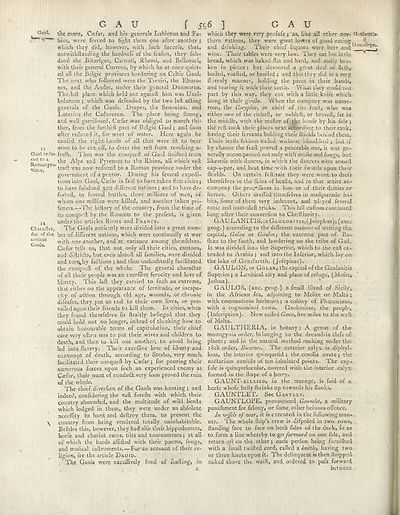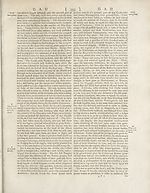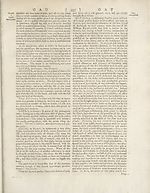Encyclopaedia Britannica > Volume 7, ETM-GOA
(644) Page 596
Download files
Complete book:
Individual page:
Thumbnail gallery: Grid view | List view

G A U [ CC.6 ] G A U
t’ne more, Cacfar, and his generals Labienus and Fa-
v—"‘- bins, were forced to fight them one after another ;
which they did, however, with 1'uch fuccefs, that,
notwithllanding the hardnefs’ of the feafon, they fub-
dued the Bituriges, Carnuti, Rhemi, and Bellovaci,
with their general Corretis, by which he at once quiet¬
ed all the Belgic provinces bordering on Celtic Gaul.
The next who followed were the Treviri, the Eburo-
n.es, and the Andes, under their general Dunmarus.
The/laft place which held out againlt him was Uxel-
lodunum ; which was defended by the two lall acting
generals of the Gauls. Drapes, the Senonian, and
Luterius the Cadurcean. The place being llrong,
and well garrifoned, Caefar was obliged to march thi¬
ther, from the fartheft part of Belgic Gaul; and foon
after reduced it, for want of water. Here again he
caufed the right-hands of all that were fit to bear
ix arms to be cut off, to deter the reft from revolting a-
Gaul redu- frefh. Thus was the conqueft of Gaul finiflied from
ced to a A]pS an3 Pyrenees to the Rhine, all which vaft:
vince. ” traftwas now reduced to a Roman province under the
government of a praetor. During his feveral expedi¬
tions into Gaul, Caefar is faid to have taken Bco cities;
to have fuhdued 300 different nations; and to have de¬
feated, in feveral battles, three millions of men, of
whom one million were killed, and another taken pri-
foners.—The hiltory of the country, from the time of
its conqueft by the Romans to the prefent, is given
Ia under the articles Rome and France.
Charaifter, The.Gauls anciently were divided into a great num-
&c of the her of different nations, which were continually at war
™ with one another, and at variance among themfelves.
aU ** Ctefar tells us, that not only all their cities, cantons,
and diftridts, but even almoft all families, were divided
and torn,by fadtions ; and thus undoubtedly facilitated
the conqueft; of the whole. The general charadler
of all thefe people was an exceffive ferocity and love of
liberty. This laft they carried to fuch an extreme,
that either on the appearance of fervitude, or incapa¬
city of adtion through old age, wounds, or chronic
difeafes, they put an end to their own lives, or pre¬
vailed upon their friends to kill them. In cities, when
they found themfelves fo ftraitly befie.ged that they
Could hold out no longer, inftead of thinking how to
obtain honourable terms of capitulation, their chief
care very often was to put their wives and children to
death, and then to kill one another, to avoid being
ltd into flavery. Their exceffive love of liberty and
contempt of death, according to Strabo, very muck,
facilitated their conqueft by Caefar for pouring their
numerous forces upon fuch an experienced enemy as
Caefar, their want of condu<9t very foon proved the ruin
of the whole.
The chief diverfion of the Gauls was hunting ; and.
indeed, ponfidering the «aft forefts with which, their,
country abounded, and the multitude of wild beafts
which lodged in them, they were under an abfolute
neceffity to bunt and deftroy them, to prevent the
\ country from being rendered totally uninhabitable.
Befides this, however, they had alfo their hippodromes,
horfe and chariot races, tilts and tournaments; at all
of which the bards affifted with their poems, fougs,..
and mufical inftruments.-^For an account of their re¬
ligion, fee the article Druid.
The Gauls were exeeffively fond of fcafting, in
which they were vary profufe ; as, like all other nor- Gankniti*
them nations, they were great lovtrs of good eating if
and drinking. Their chief liquors were beer and G:iunt °Pe‘
wine. Their tables were very low. They eat hut little,
bread, which was baked flat and hard, and eaiily bro¬
ken in pieces: but devoured a great deal of fldhy
boiled, roafted, or,broiled ; and this they did in a very
Ibvenly manner, holding the piece in their hands,
and tearing it with their teeth. What they could not
part by this way, they cut with a little knife which
hung at their girdle. When the company was nume¬
rous, the Coryphee, or chief of the fealt, who was
either one of the richeft, or nobleft, or braveft, fat in
the middle, with the mailer of thf houfe by his fide ;
the reft took their places next according to their rank,
having their fervants holding their Ihields behind them.
Thefe leal'ts feidom fended without bioodlhed ; but if
by chance the feaft proved a peaceable one, it was ge¬
nerally accompanied not only with mufic and fongs, but
likewife with dances, in which the dancers were armed
cap-a-pee, and beat time with their fwords upon their
lh:elds. On certain feftiyals they were wont to drefs
themfelves in the fkins of beafts, and in that attire ac¬
company the proc*flions in honour of their deities or
heroes. Others drefffed themfelves in maiquerade ha¬
bits, fome of them very indecent, and pi -yed feveral
antic and imirtodeft tricks. This laft cullom continued
long after their converfion to Chriftianity.
GAULANITIS,orGAULONiris,( Joi'ephus); (ance
geog.) according to the different manner of writing the;
capital, Golan or Gaulon; the extreme part of Ba-
(ban to the fouth, and bordering on the tribe of Gad.
It was divided into the Superior, which to the call ex¬
tended to Arabia ; and into the Inferior, which lay.on
the lake of Genefareth, (Jofephus).
GAULON, or Golan, the capital of the Gaulanitia
Superior; a Levitical city and place of refuge, (Mofes,
Jolhua).
GAULOS, (anc. geog.) a fmall ifland of Sicily,
in the African fea, adjoining to Melite or Malta ;
with commodious harbours; a colony of Phoenicians,
with a cognominal town. Gaulonitae, the people,
(Infcription). Now called Gwso,five, miles to the well
of Malta.
GAULTHERIA, in botany: A genus of the
monogynia order, belonging to the decandria clafs o£
plants; and in the natural method ranking under the
18th order, Bicoi~nes. The exterior calyx is diphyl-
lous, the interior qutnquefid ; the.corolla ovate; the
nedlariiun confifts of ten fubulated points. The cap-
fule is quinquelocular, covered with the-interior . calyx,
formed in the lhape of a berry.;
GAUNT-bellied, in the manege, is faid of a
horfe whofe belly Ihrinks up towards his flanks.
GAUNTLET. See Gantlet.
GAUNTLOPE, pronounced Gauntlet, a military
punilhroent for felony, or fame other heinous offence.
In wjfels of war, it is executed in the following-man¬
ner. The whole (hip’s crevy is djfpofed in two rows.
Handing face to face on both fides of the deck, fo as
to form a line whereby to go forward on one fide, and
return aft on the other; each perfon being furniflied
with a fmall twilled cord, called a knittle, having two
or three knots upon it. The delinquent is then dripped
naked above the wailt, and. ordered to pafs forward
between
t’ne more, Cacfar, and his generals Labienus and Fa-
v—"‘- bins, were forced to fight them one after another ;
which they did, however, with 1'uch fuccefs, that,
notwithllanding the hardnefs’ of the feafon, they fub-
dued the Bituriges, Carnuti, Rhemi, and Bellovaci,
with their general Corretis, by which he at once quiet¬
ed all the Belgic provinces bordering on Celtic Gaul.
The next who followed were the Treviri, the Eburo-
n.es, and the Andes, under their general Dunmarus.
The/laft place which held out againlt him was Uxel-
lodunum ; which was defended by the two lall acting
generals of the Gauls. Drapes, the Senonian, and
Luterius the Cadurcean. The place being llrong,
and well garrifoned, Caefar was obliged to march thi¬
ther, from the fartheft part of Belgic Gaul; and foon
after reduced it, for want of water. Here again he
caufed the right-hands of all that were fit to bear
ix arms to be cut off, to deter the reft from revolting a-
Gaul redu- frefh. Thus was the conqueft of Gaul finiflied from
ced to a A]pS an3 Pyrenees to the Rhine, all which vaft:
vince. ” traftwas now reduced to a Roman province under the
government of a praetor. During his feveral expedi¬
tions into Gaul, Caefar is faid to have taken Bco cities;
to have fuhdued 300 different nations; and to have de¬
feated, in feveral battles, three millions of men, of
whom one million were killed, and another taken pri-
foners.—The hiltory of the country, from the time of
its conqueft by the Romans to the prefent, is given
Ia under the articles Rome and France.
Charaifter, The.Gauls anciently were divided into a great num-
&c of the her of different nations, which were continually at war
™ with one another, and at variance among themfelves.
aU ** Ctefar tells us, that not only all their cities, cantons,
and diftridts, but even almoft all families, were divided
and torn,by fadtions ; and thus undoubtedly facilitated
the conqueft; of the whole. The general charadler
of all thefe people was an exceffive ferocity and love of
liberty. This laft they carried to fuch an extreme,
that either on the appearance of fervitude, or incapa¬
city of adtion through old age, wounds, or chronic
difeafes, they put an end to their own lives, or pre¬
vailed upon their friends to kill them. In cities, when
they found themfelves fo ftraitly befie.ged that they
Could hold out no longer, inftead of thinking how to
obtain honourable terms of capitulation, their chief
care very often was to put their wives and children to
death, and then to kill one another, to avoid being
ltd into flavery. Their exceffive love of liberty and
contempt of death, according to Strabo, very muck,
facilitated their conqueft by Caefar for pouring their
numerous forces upon fuch an experienced enemy as
Caefar, their want of condu<9t very foon proved the ruin
of the whole.
The chief diverfion of the Gauls was hunting ; and.
indeed, ponfidering the «aft forefts with which, their,
country abounded, and the multitude of wild beafts
which lodged in them, they were under an abfolute
neceffity to bunt and deftroy them, to prevent the
\ country from being rendered totally uninhabitable.
Befides this, however, they had alfo their hippodromes,
horfe and chariot races, tilts and tournaments; at all
of which the bards affifted with their poems, fougs,..
and mufical inftruments.-^For an account of their re¬
ligion, fee the article Druid.
The Gauls were exeeffively fond of fcafting, in
which they were vary profufe ; as, like all other nor- Gankniti*
them nations, they were great lovtrs of good eating if
and drinking. Their chief liquors were beer and G:iunt °Pe‘
wine. Their tables were very low. They eat hut little,
bread, which was baked flat and hard, and eaiily bro¬
ken in pieces: but devoured a great deal of fldhy
boiled, roafted, or,broiled ; and this they did in a very
Ibvenly manner, holding the piece in their hands,
and tearing it with their teeth. What they could not
part by this way, they cut with a little knife which
hung at their girdle. When the company was nume¬
rous, the Coryphee, or chief of the fealt, who was
either one of the richeft, or nobleft, or braveft, fat in
the middle, with the mailer of thf houfe by his fide ;
the reft took their places next according to their rank,
having their fervants holding their Ihields behind them.
Thefe leal'ts feidom fended without bioodlhed ; but if
by chance the feaft proved a peaceable one, it was ge¬
nerally accompanied not only with mufic and fongs, but
likewife with dances, in which the dancers were armed
cap-a-pee, and beat time with their fwords upon their
lh:elds. On certain feftiyals they were wont to drefs
themfelves in the fkins of beafts, and in that attire ac¬
company the proc*flions in honour of their deities or
heroes. Others drefffed themfelves in maiquerade ha¬
bits, fome of them very indecent, and pi -yed feveral
antic and imirtodeft tricks. This laft cullom continued
long after their converfion to Chriftianity.
GAULANITIS,orGAULONiris,( Joi'ephus); (ance
geog.) according to the different manner of writing the;
capital, Golan or Gaulon; the extreme part of Ba-
(ban to the fouth, and bordering on the tribe of Gad.
It was divided into the Superior, which to the call ex¬
tended to Arabia ; and into the Inferior, which lay.on
the lake of Genefareth, (Jofephus).
GAULON, or Golan, the capital of the Gaulanitia
Superior; a Levitical city and place of refuge, (Mofes,
Jolhua).
GAULOS, (anc. geog.) a fmall ifland of Sicily,
in the African fea, adjoining to Melite or Malta ;
with commodious harbours; a colony of Phoenicians,
with a cognominal town. Gaulonitae, the people,
(Infcription). Now called Gwso,five, miles to the well
of Malta.
GAULTHERIA, in botany: A genus of the
monogynia order, belonging to the decandria clafs o£
plants; and in the natural method ranking under the
18th order, Bicoi~nes. The exterior calyx is diphyl-
lous, the interior qutnquefid ; the.corolla ovate; the
nedlariiun confifts of ten fubulated points. The cap-
fule is quinquelocular, covered with the-interior . calyx,
formed in the lhape of a berry.;
GAUNT-bellied, in the manege, is faid of a
horfe whofe belly Ihrinks up towards his flanks.
GAUNTLET. See Gantlet.
GAUNTLOPE, pronounced Gauntlet, a military
punilhroent for felony, or fame other heinous offence.
In wjfels of war, it is executed in the following-man¬
ner. The whole (hip’s crevy is djfpofed in two rows.
Handing face to face on both fides of the deck, fo as
to form a line whereby to go forward on one fide, and
return aft on the other; each perfon being furniflied
with a fmall twilled cord, called a knittle, having two
or three knots upon it. The delinquent is then dripped
naked above the wailt, and. ordered to pafs forward
between
Set display mode to:
![]() Universal Viewer |
Universal Viewer | ![]() Mirador |
Large image | Transcription
Mirador |
Large image | Transcription
Images and transcriptions on this page, including medium image downloads, may be used under the Creative Commons Attribution 4.0 International Licence unless otherwise stated. ![]()
| Encyclopaedia Britannica > Encyclopaedia Britannica > Volume 7, ETM-GOA > (644) Page 596 |
|---|
| Permanent URL | https://digital.nls.uk/189129601 |
|---|
| Attribution and copyright: |
|
|---|
| Description | Ten editions of 'Encyclopaedia Britannica', issued from 1768-1903, in 231 volumes. Originally issued in 100 weekly parts (3 volumes) between 1768 and 1771 by publishers: Colin Macfarquhar and Andrew Bell (Edinburgh); editor: William Smellie: engraver: Andrew Bell. Expanded editions in the 19th century featured more volumes and contributions from leading experts in their fields. Managed and published in Edinburgh up to the 9th edition (25 volumes, from 1875-1889); the 10th edition (1902-1903) re-issued the 9th edition, with 11 supplementary volumes. |
|---|---|
| Additional NLS resources: |
|

